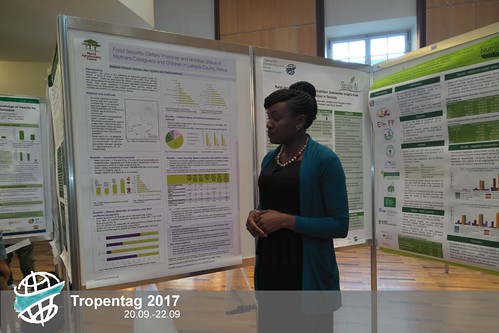Malnutrition in Africa: Oh, the Irony!
It is 8:00 a.m. and I am already at the Agrobiodiversity and Nutrition diversity poster session. Today, I am doubling as a student reporter and a poster presenter. The room is filled with enthusiastic faces, hungry for information on the topic. The session started on high note with a presentation on potato farming in Peru. However, something caught my eye throughout the presentations. All the other topics, including mine were about Africa. One of the speakers swept me away with his research on biofortification of cassava. This is good news! However, allow me to talk about the other side of the story.
Why do we still have high rates of malnutrition in Africa? The irony is, Africa is rich in food diversity. Most of this is unexploited. We are either unaware or have deep-set food cultures that hinder us from exploiting unfamiliar food varieties. A good example is the mopane worm, a saturniid consumed in Southern Africa. Other worms in the same category are widely consumed in Central the Western Africa. Although they are found all over Kenya, only a small group from the Giriama tribe in coastal Kenya consumes them. Brenda Wekesa cited malnutrition in mothers/caregivers in Laikipia county, Kenya, low consumption of proteins. The irony is I found lots of Cirina forda in Lakipia during my field visits. This is an edible saturniid that could supplement the diet of this community. In another instance, Jacob Sarfo spoke about wild plants in Turkana, Kenya that are highly nutritious. There is also an underutilized stinging nettle variety in Ethiopia that is also very nutritious!

Brenda Wekesa presenting a poster on "Food Security, Dietary Practices and Nutrition Status of Mothers/Caregivers and Children in Laikipia County, Kenya." Recently, I have been posting ‘bugs for food’ on my Facebook page and the response from my friends is worrying. They don't seem not to buy the idea. I don't blame them. I used to be like them. That is until I realized that I needed to change my perceptions and that of others regarding food. I am not there yet (I do not eat cheese), but slowly, we can get there. It is not about eating everything. It is more about being more open-minded about food options. We should not die from hunger while food hangs from trees everywhere around us. No. I want to see more success stories on nutrition in Africa at Tropentag 2018 in Belgium. And it is our duty, me and you, to change the narrative.





Comments
Post new comment